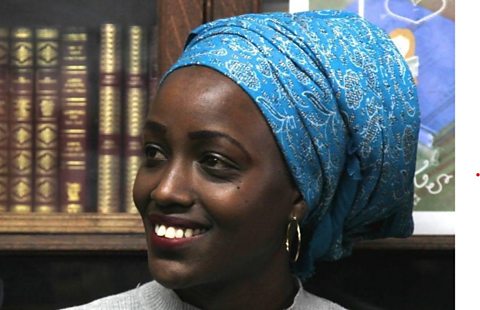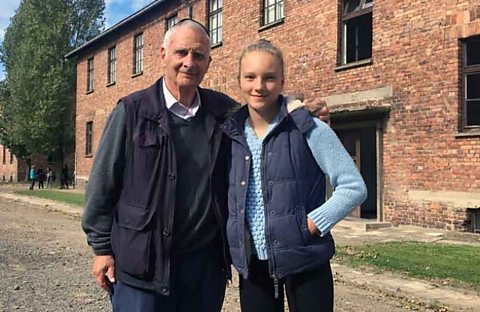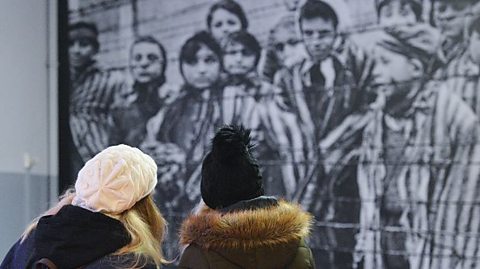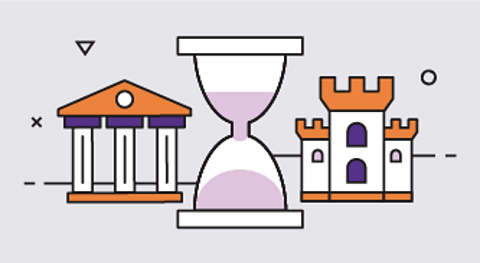Every year on 27 January, the UK marks Holocaust Memorial Day.
Coinciding with the anniversary of the liberation of Auschwitz-Birkenau, the biggest Nazi death camp, this day promotes remembrance of the six million Jewish people murdered during the Holocaust, as well as millions of other people who were persecuted and killed by the Nazis. On this day we also remember people who were killed in the The attempt to kill or destroy national, ethnical, racial or religious groups. in Cambodia, Rwanda, Bosnia and Darfur.
As part of the commemorations, ┤¾Ž¾┤½├Į Bitesize has asked Antoinette, a survivor of the genocide against the Tutsi population in Rwanda, to tell us why she has decided to focus on forgiveness and reconciliation after experiencing such atrocities.


'My world was turned upside down'
I was born and raised in Kigali, the capital of Rwanda, an African country the size of Wales. And just as beautiful! I had three brothers and being the only girl had its advantages ŌĆō my brothers really loved me as their big sister, and we shared many wonderful moments that have stayed with me to this day.
I was just 11 years old when my world was turned upside down by the genocide against the Tutsi in 1994. For three months, I lived in the bush (a large area of wild, uncultivated land), hiding from killers who had brutally murdered most of my family, including my mother and youngest brother. I survived on rain water and sweet potatoes that I dug up from nearby farms. During that time, I saw friends, neighbours and even family members turn on each other.
I also spent three weeks hiding in a disused pit toilet, a simple hole in the ground with no flushing system. As you can imagine, the terrible smell was the least of my worries. One day as I hid in that toilet, I overheard the Hutu killers laughing and joking about the terrible crimes they had been committing. To say that I was numb with fear would be an understatement.
I wore the same clothes for three months and witnessed horrific atrocities, things most people see only in movies. As well as witnessing my family being murdered, I also survived a massacre in a church. In total, 80 members of my extended family were killed.

'I was not going to be a prisoner of my past'
After settling in the UK, I now spend most of my time educating young people about the dangers of prejudice and intolerance. My husband and I are working with a centre which promotes peace and reconciliation near London. My journey of forgiveness has not been easy or instant. In fact, in common with many survivors of extreme trauma, I have suffered from flashbacks and thoughts of despair and hopelessness. But I am clear in my mind that I was not going to be a prisoner of my past.
This is why I even met some of my familyŌĆÖs killers in prison, always with a determination to pursue forgiveness and where possible, even reconciliation.
I have taken my message about the power of forgiveness to thousands of young people in schools and community centres across the UK. I have personally visited and spoken to traumatised refugees from the war in South Sudan, and many other refugees in Burundi and Lebanon. I do not share the horrors of what I went through to scare people but to encourage and inspire everyone to live in harmony.
'We must remain vigilant'
We know that hostility based on identity has not gone away. A large number of people in our world live their lives with an undercurrent of discrimination and prejudice. As our world seems to get more polarised, we must remain vigilant and never forget what happens when prejudice goes unchallenged. For this reason, I am proud and honoured to work with organisations, such as the Holocaust Memorial Day Trust, that highlight the recent history of genocide, so that we can learn from it and be more empathetic and inclusive today. Every human life is worth living.
I witnessed the dark side of humanity before I reached my teens. My dignity as a human being was taken away as I lived like a wild animal in the bush with nothing to eat and nowhere to sleep. It is my responsibility now to help ensure that no young person does go through what I went through. I would not be the person I am today if I had not chosen to walk in love ŌĆō even loving those who have caused me such trauma and pain.
Commemorating Holocaust Memorial Day will not bring back my mother, brother, or members of my family, but it helps hugely to know that people across the UK and beyond come together every year to remember victims of genocide like myself. I will be lighting a candle in my window at 8pm on 27 January in their memory.
This article was published in January 2022
Finding my Family: Holocaust
A Newsround Special

What is Holocaust Memorial Day?
Why the world pauses every year to remember genocide victims.

World War 2. collection
If you want to learn more about WWII, have a flick through this KS3 History content.
